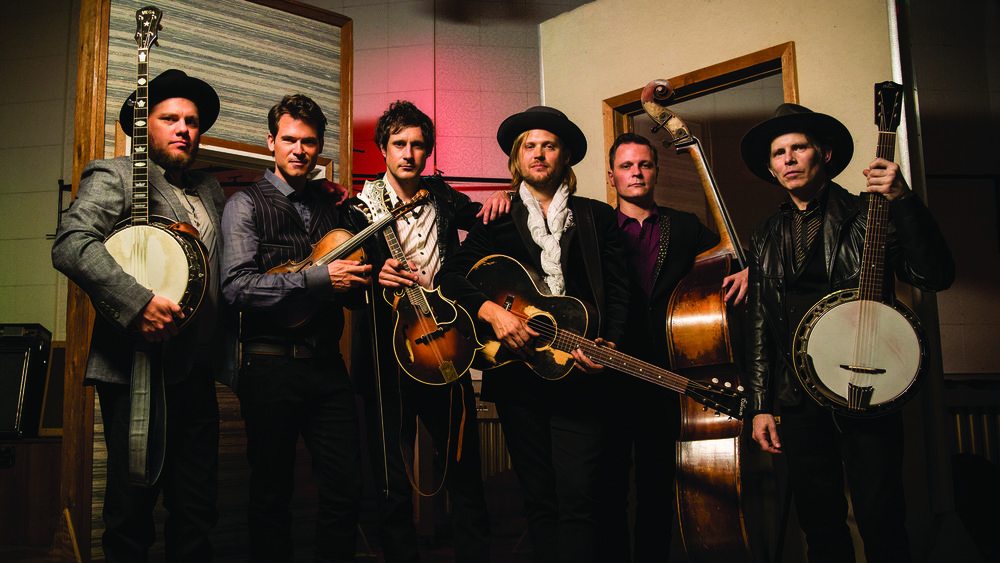It’s been 20 years since beloved Grammy-winning, sometimes-bluegrass band Old Crow Medicine Show formed on the street corners of New York, and all that time singing and playing fiddle, banjo and harmonica has given frontman Ketch Secor a lot to think about. Like what makes a song matter. And racehorses. And death. I’ll let him tell you about it. You can catch Old Crow at the Palace on Friday.
What I miss are the ways the tip jar grows, and you can sort of time your show based by your tips. I miss being paid in ones, and that feeling of accomplishment. When you’re a salaried musician, you go on from town to town, and at the end of the tour, six weeks later, after the taxes are taken out, there’s your dough in a bag. There’s something about having 78 one-dollar bills in your back pocket and wiping the sweat from your brow and heading out into the limelight. In a town that you may or may not know, but feeling like a king, feeling like a local who just made good, and made bank.
When you’re in the world’s greatest bluegrass band that wasn’t a bluegrass band, you feel pretty low on the celebrity totem pole. We don’t really have to deal with celebrity. We’re right at a sweet spot of accomplishment in which we’ve become a household name for folks who care about fiddles and banjos, but nobody else knows. And it’s sort of better that way. Cause we can go and get ourselves a hot brown and not have to get a bunch of selfies made while we’re waiting for it to arrive.
I grew up mostly in Virginia. I was in New Hampshire at prep school. That’s where I saw Allen Ginsburg. It was really amazing. And what was really amazing is that I thought to go to it, because I didn’t have to. It was at 7 o’ clock at night. I could have been watching Beverly Hills 90210. And instead I was sitting there in the front row at the feet of Allen Ginsburg, just hanging on every word. Couldn’t believe that there was a 75-year-old man in front of me who was telling me to smoke dope. Or telling me not to smoke dope in a singsong way. Whatever it was, it had this kinda sunflower-sutra, with a hurdy gurdy. He had a hurdy gurdy, which is like a tabletop model, and I never saw anybody play one of those since.
I’m totally great with “Rock Me Mama.” I think it’s amazing and miraculous and I have nothing but positive vibes for “Rock Me Mama Like a Wagon Wheel.” It’s just so rare that something like that can happen in this world. And I didn’t make it a hit. It was made a hit by your high school band, you and your friends times a million. Because there was a million other people that were also playing it in their high school bands, or in their glee clubs, or their college barbershop band, or on their girl’s weekend mix tape or their swim club ride home from the away-team pool — all of those places in which music is part of life. And it’s particularly meaningful to me, because the songs that I put in those places — my ride home on the bus from the six-week canoe trip — that’s when I heard “Tangled Up in Blue.” That’s when some other kid heard “Rock Me Mama.” That’s great. Or my mixtape where I heard “Hello, Darkness, My Old Friend.” Those moments in which songs really strike ya have a lot more to do with you than they do with songs. And so it’s possible that really any song could take that moment. Heartbreak, your first kiss, winning or losing, whatever it is. Death.
“The City of New Orleans,” that thing knocked my teeth out. I thought that was the greatest song ever written on earth. “Like a Rolling Stone,” that thing just reduced me to a pulp. And then earlier than that, I think “Thriller” made me feel pretty invincible....What made “The City of New Orleans” a great song in my youth is that I played it. It was my voice singing it, not Steve Goodman’s or Arlo Guthrie’s or Willie Nelson’s. And when you put your own voice into the song, that’s really the proud moment. For me, that’s where the memory lies.
Songs are the soapbox that you stand on so that you can be the sidewalk preacher. We all want to be the sidewalk preacher. I know I did. I don’t know that everybody does. But Cassius Clay did. And I think anybody who wants to tell a story does. And I saw the sidewalk preacher, I saw him in all the towns we lived in. And I knew that I had a message, and I just needed a soapbox. That’s all you needed, was a milk crate. So the music became the milk crate for me. And I overturned it, and I stood up on top of it and put my voice as the diamond in the setting.
You know, some folks, they go to Graceland. Some folks, they just go anywhere in Florida. For me, I would say, Go see (1995 Breeders’ Cup-winning racehorse) Cigar, y’all. Go to Lexington, go see Cigar. (Cigar died in 2014. He never won the Derby, but he did win a hell of a lot of races, including the Dubai World Cup, and he was a two-time horse of the year. —Ed.) If you live six hours from anywhere in the bluegrass state, make the trip. Go see Cigar. Cause you only got a couple years left to go see Cigar. I think there’s just something about going to see an old horse. Makes you feel more American than your neighbor....So at the end of the tour, it’s like when you go to the Country Music Hall of Fame, and you see all this stuff, and there’s somebody’s Cadillac and somebody’s guitar and somebody’s shirt, belt buckle. But at the end of it, you go to the Hall of Legends. And that’s when you confront death. And that’s the thing that you’re all there to see, is mortality. I’m sure the same thing is true at the Muhammad Ali monument or museum, or International Boxing Hall of Fame, wherever that is. Ultimately, what I think we want is to experience both mortality and immortality, because that’s what a hall of fame is. So when you see, when you go to the end of the Kentucky Horse Park, and they parade out the living legends, and there’s this squawky voice on the recalcitrant loudspeaker saying, “And here he is, folks.” And they play a highlight reel of his race. And then he comes out. It’s really kind of anthropomorphic personification of the unbridled spirit made human. And that’s always exciting too, when you superimpose your own feelings. Like, “Oh, take a bow, Cigar,” and he farts.
If I could get anywhere near the talent of that horse, I’d love to relate. I’d love to relate more. As a human being, and as an artist. Isn’t that what Allen Ginsburg’s doing with the hurdy gurdy, is trying to relate to whales? Why the fuck else would you play a hurdy gurdy? It’s because you’re trying to relate to two-toned, onomatopoeic languages. EE, AAH, EE, AAH — that’s what you got. You know, when you hear indigenous groups singing, whether on records recorded in Zambia in the ’40s, or medicine singers in Glacier Park in the 1890s — both of these groups have made records, whether on wax or shellac or magnetic tape or whatever — and you hear these same two-tone sounds. You hear a wildness. You hear a kind of non-human connection. And man that’s the stuff that the poet aspires to. It’s about shedding humanity and moving beyond it, about the transformative power of music. So, yeah, I see Cigar, and I think about my own inner-Derby winner, the Triple Crown.
If I could be anything like either Cigar or Pete Seeger — I mean, I’d be living up into my 80s, man. I don’t know how old he is — Cigar, I mean — in horse years, but surely the dude’s pushing 140. He’s like Methusula. And the last time I saw Pete Seeger in the flesh, he was 89 years old? I was with Willie Nelson, a couple weeks ago blowing harmonica on stage with him, about 3 feet away from his big smile and his flapping arm skin, which hangs about 4 inches from his bones, cause he’s 84 and he looks that way. But the thing that’s different about Cigar and Willie Nelson, of course, is that Willie Nelson can still win the Derby every fucking night. That’s what I’m shooting for. I still wanna win place or show when I’m an old man.



